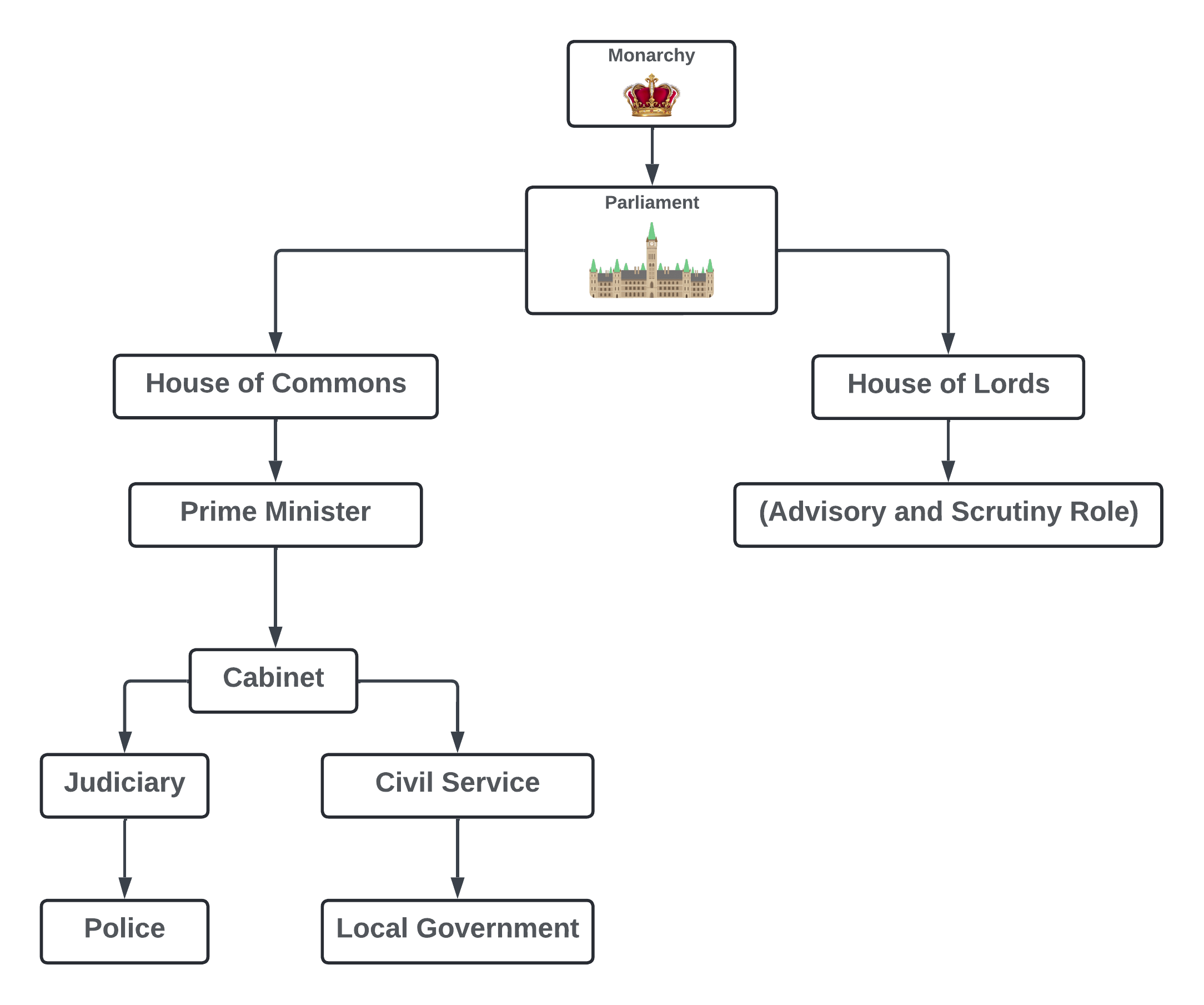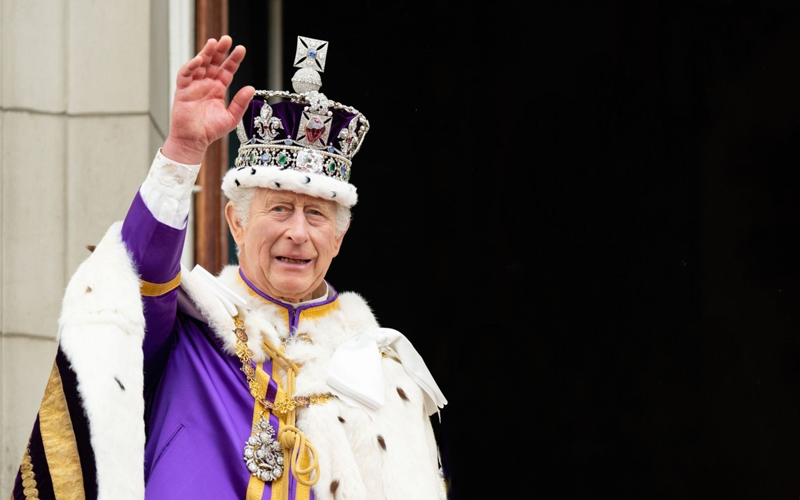British Democracy and Constitution
A democracy is a system of government where the whole adult population has a say, either by direct voting or by electing representatives.
A constitution is a set of principles, laws, and conventions that defines how a country is governed, outlines the roles of institutions responsible for running the country.
- Development of British Democracy
- Chartist Movement – 1830s–1840s
- Women and Voting Rights
- British Constitution
- Constitutional Institutions
- The Monarchy – King Charles III
- National Anthem
- Oath and Affirmation of Allegiance
- System of Government
- House of Commons
- House of Lords
- The Speaker
- Elections in the UK
Development of British Democracy
- At the start of the 19th century, Britain was not a full democracy:
- Only men over 21 who owned property could vote.
- Elections existed, but the franchise (right to vote) was limited.
- During the 19th century, the franchise expanded, and political parties began including ordinary men and women.
Chartist Movement – 1830s–1840s
- A group called the Chartists campaigned for major voting reforms.
- They demanded six voting reforms:
- for every man to have the vote
- elections every year
- for all regions to be equal in the electoral system
- secret ballots
- for any man to be able to stand as an MP
- for MPs to be paid
- At the time, their campaign was seen as a failure, but by 1918, most of their demands were adopted.
Women and Voting Rights
- In 1918, voting rights were extended to:
- Women over 30
- Also, more men (not only property owners)
- In 1928, equal voting rights were granted to men and women over 21.
- In 1969, the voting age was reduced to 18 for both men and women.
British Constitution
- The British Constitution is not written in a single document – it is often described as "unwritten".
- It is a combination of laws, conventions, and traditions.
- It has evolved gradually over hundreds of years, rather than being created by a revolution like in America or France.
Debate
- Some believe the UK should have a single written constitution for clarity and accountability.
- Others argue that an unwritten constitution offers greater flexibility and allows for more responsive governance.
Constitutional Institutions
The UK government includes several institutions, each with distinct roles:
- Monarchy: Ceremonial Head of State.
- Parliament:
- House of Commons: Elected MPs create and pass laws.
- House of Lords: Unelected members review and suggest changes to laws.
- Prime Minister: Leads the government.
- Cabinet: Senior ministers, chosen by the Prime Minister, help make decisions.
- Judiciary (Courts): Interprets and enforces laws.
- Police: Maintains public order and enforces laws.
- Civil Service: Assists with policy-making and administration.
- Local Government: Manages local services like education and housing.

Devolved Governments
- Scotland, Wales, and Northern Ireland have their own devolved governments.
- They have the power to legislate on certain issues (e.g., health, education, transport).
The Monarchy
- King Charles III is the UK’s head of state and monarch of 14 other Commonwealth countries.
- The UK has a constitutional monarchy, meaning the monarch’s powers are limited by law and Parliament. The monarch does not rule directly or make government policy decisions.
- Role in Government
- The monarch formally appoints the Prime Minister, usually the leader of the party with the most MPs in the House of Commons or a coalition.
- The monarch meets regularly with the Prime Minister to advise, warn, and encourage but does not decide policies (decisions are made by the Prime Minister and Cabinet).
- Ceremonial Duties
- Opens and dissolves Parliament.
- Gives royal assent to laws passed by Parliament (a formality).
- Represents the UK at home and abroad, hosting state visits and symbolizing national unity.
- Confers honors, such as knighthoods and peerages.
- The monarch is the symbolic Head of the Commonwealth, a voluntary association of 56 countries.
- The monarch remains politically neutral and provides stability and continuity for the UK’s government.

King Charles III
King Charles III - Personal Details
- King Charles III became king in September 2022 after the death of Queen Elizabeth II.
- He is married to Camilla, Queen Consort.
- Prince William, the Prince of Wales, is now the heir to the throne.
National Anthem
The National Anthem of the UK is ‘God Save the King’. It is played at important national occasions and at events attended by the monarch or the Royal Family.
God save our gracious King!
Long live our noble King!
God save the King!
Send him victorious,
Happy and glorious,
Long to reign over us,
God save the King!
Oath and Affirmation of Allegiance
When becoming a British citizen, new citizens swear or affirm loyalty to the monarch.
Oath of allegiance
I, (name), swear by Almighty God that, on becoming a British citizen, I will be faithful and bear true allegiance to His Majesty King Charles III, his Heirs and Successors, according to law.
Affirmation of allegiance
I (name) do solemnly, sincerely and truly declare and affirm that on becoming a British Citizen, I will be faithful and bear true allegiance to His Majesty King Charles III, his Heirs and Successors, according to law.
What is the difference between oath and affirmation?
An oath involves swearing to God, while an affirmation is a non-religious pledge.
System of Government
- The UK has a parliamentary democracy.
- The UK is divided into parliamentary constituencies.
- Each constituency elects a Member of Parliament (MP) during a General Election.
- All the elected MPs form the House of Commons.
- The party that has the majority of MPs forms the government.
- If no single party gets a majority, a coalition of two parties may form the government.
House of Commons
- The House of Commons is more important than the House of Lords because its members are elected by voters.
- The Prime Minister and almost all members of the cabinet are Members of Parliament (MPs) in the House of Commons.
- Each MP represents a parliamentary constituency, which is a small area of the country.
Responsibilities of an MP
- Representing everyone in their constituency
- Helping create new laws
- scrutinise and comment on what the government is doing
- Debating important national issues
House of Lords
Members of the House of Lords, known as peers, are not elected by the public and do not represent constituencies.
Role of the House of Lords
- Suggesting amendments or proposing new laws
- Checking laws passed by the House of Commons
- Holding the government to account
Note: House of Commons can overrule the House of Lords, this power is rarely used.
The Speaker
- The Speaker chairs debates in the House of Commons and is the chief officer of the House.
- The Speaker is neutral and does not represent a political party, despite being an MP, representing a constituency, and dealing with constituents' problems like any other MP.
- The Speaker is chosen by other MPs in a secret ballot.
Responsibilities of the Speaker
- Maintaining order during debates and ensuring that rules are followed.
- Guaranteeing that the opposition has a guaranteed amount of time to debate issues it selects.
- Representing Parliament on ceremonial occasions.
Elections in the UK
UK General Elections
- Held at least every five years to elect Members of Parliament (MPs).
- First Past the Post – The candidate with the most votes in each constituency is elected.
- If an MP dies or resigns, a by-election is held in that MP's constituency to elect a new representative.
European Parliamentary Elections
- Held every five years to elect Members of the European Parliament (MEPs).
- Proportional Representation – Seats are allocated to each party in proportion to the total number of votes they receive.
Contacting Elected Members
-
All elected members have a duty to serve and represent their constituents.
-
You can find contact details for MPs, Assembly members, MSPs, and MEPs in -
- Local libraries
- www.parliament.uk
- The Phone Book (published by BT)
- Yellow Pages
-
By letter or telephone at their constituency office or their office in the House of Commons:
House of Commons
Westminster, London SW1A 0AA,
Telephone: 020 7729 3000
-
Many elected members hold regular local ‘surgeries’ where constituents can meet in person to discuss concerns. These surgeries are usually advertised in local newspapers.
 Try Life in the UK
Try Life in the UK